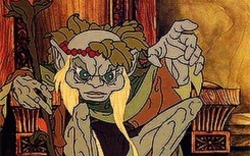whafrog wrote:
It's a bit more than that, because a 6 is an auto-win.
The "auto-win" scenario still doesn't
really account for higher Fight score unless the opponent rolls a 6 as well, though. Technically, if I have a higher Fight score and roll a 6, and my opponent rolls a 5, my higher Fight score had nothing to do with me winning. Telchar is correct, in that in a one-on-one fight with only one attack per side, Fight score only matters in 1:6 possible outcomes.
The side with the higher Fight score does increase its chances of "auto-winning" with more dice, though, regardless of how many dice the opponent is rolling, because that increases the chances of rolling a 6. For example Aragorn has a pretty good shot at winning a fight no matter how many opponents he's facing, because with 3 attacks there's a fair chance of rolling at least one 6, which his opponents will be unable to beat (assuming lower Fight score). For him, Fight is
very important. So the importance of having a higher Fight score, and the ability to "auto-win", changes a lot depending on how many dice are being rolled on each side of the combat.
whafrog wrote:
Also, the odds change considerably once you add in spear support or other sources of dice (banners, attacks, etc).
Fight score is probably the most difficult to cost out because it's so contextual.
Exactly! This is what I was trying to illustrate with the following lengthy post, which I was in the process of typing up while you posted. I'll go ahead and post it anyways, but it's just illustrating the same point in more detail:
Telchar wrote:
@ Grungehog: I've had a Moria Goblin beat an ent once, and have seen elves losing to haradrim. IME, it's mainly luck, I mean, there's just a 6/36 chance that Fight will come in to play at all.
This is a somewhat simplified view, as it only applies to a scenario in which both sides are only rolling a single die (something which I find rarely happens in our games). A higher Fight score becomes more and more valuable the more attack dice you're rolling.
So yes, one-on-one an elf vs. an orc will only take into account the Fight score 1:6 times, but suppose I have two elves against two orcs (assume either a spear on both sides or a spear on one side and two combatants on the other)? Now
any combination of ties between any two dice on either side will result in a win for the elves, which is closer to 1:5 or 1:4 possible outcomes (someone better at stats can correct me if I'm wrong, but I think it works out to 0.224 probability).
Suppose I have one elf and one man against two uruk-hai, even though the man's Fight score is lower than the uruk-hai's my odds of winning are the same as if I had two elves. In that scenario obviously the elf's Fight score is valuable because it is applied to all dice on his side of the combat, not just those dice that he individually contributes, thus eliminating the uruk-hai's advantage over the man.
If I see elves lose it's practically always due to being outnumbered, not because their higher Fight score wasn't helpful.
That said, there are certain Fight scores that are, IMO, more significant than others. Fight scores of 3 and 4 are the most significant, in that the "baseline" is a 3, and therefore being equal to or one higher than most other models makes a big difference without having a huge impact on point cost. An elf's high Fight value certainly comes into play, but whether he's fighting an orc or a goblin makes no difference to him, he's higher than both (how much higher is irrelevant). The only boost he gets is against the occasional F4 opponent. Would an elf be more
efficient, in his points:utility ratio, if his Fight score was one lower and he was a bit cheaper? Maybe, but you'd sure miss that higher Fight score when you ran into an uruk-hai army.
Keeping in mind of course that these are generalities, applied to the basic warriors for the aforementioned factions, and of course heroes or elite troops can present different cases.
 Top
Top Top
Top Top
Top Top
Top Top
Top Top
Top Top
Top Top
Top Top
Top Top
Top Top
Top Top
Top









